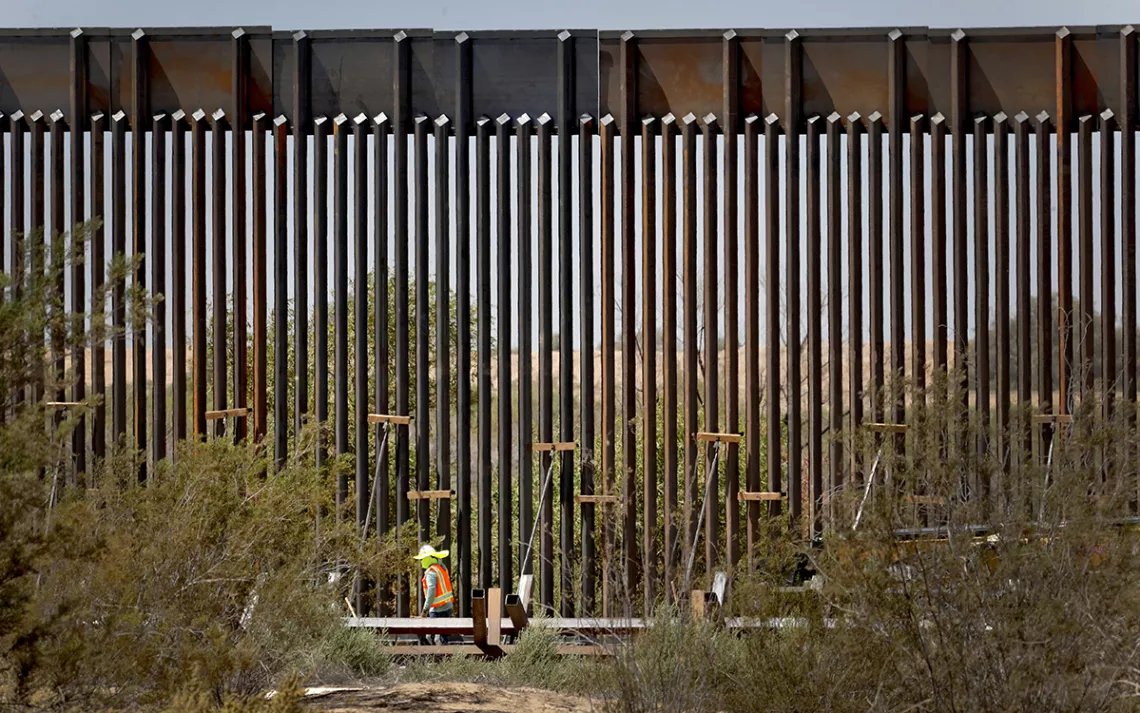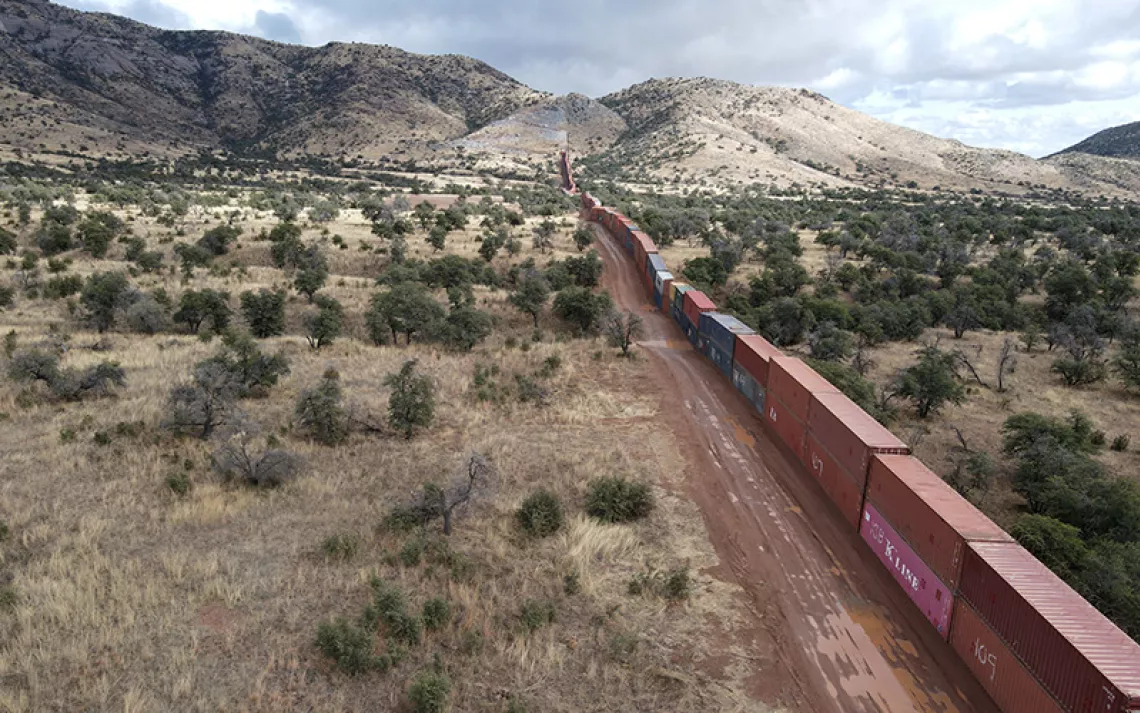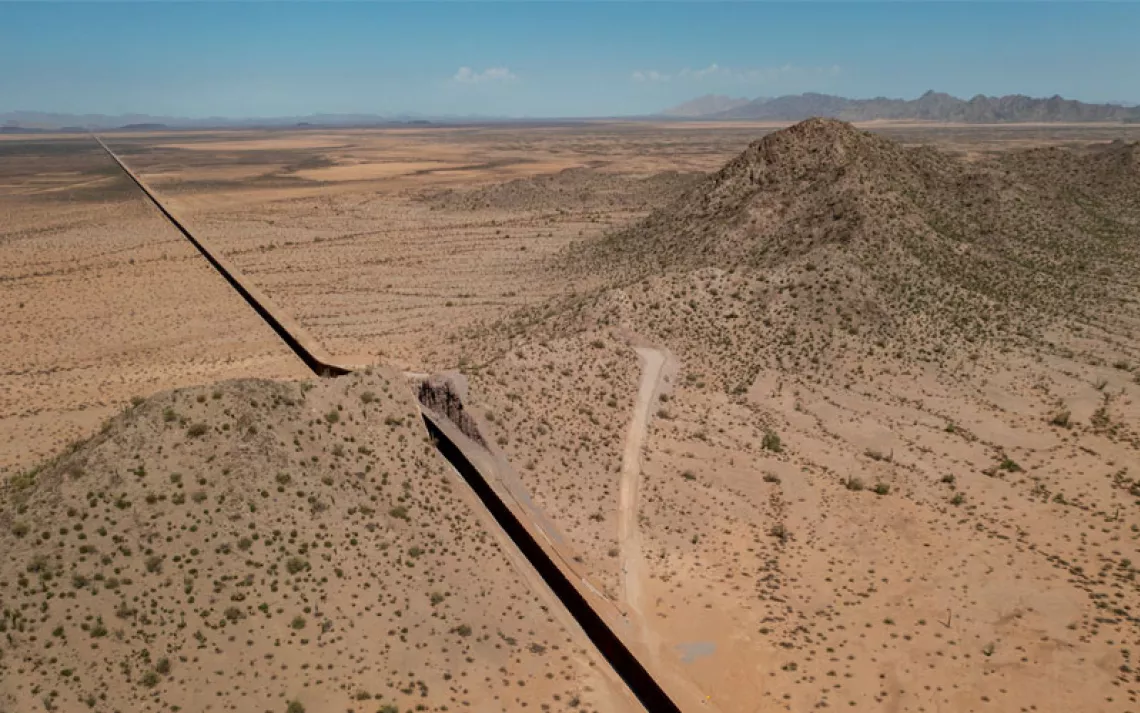Legal Battle Over the Border Wall Tests the Limits of Trump’s Power
Environmental groups are pushing back against President Trump

Photo by AP Photo/Matt York
The United States is in the midst of a national emergency—and it’s not related to the coronavirus. This emergency, the one President Donald Trump said that he “didn’t need to” declare, is about the construction of the wall along the US-Mexico border. And it’s once again landing the Trump administration in federal court, as environmental groups, led by the Sierra Club, challenge the president’s constitutional authority to transfer military funds to help build the wall.
Before the Ninth Circuit Court of Appeals on Tuesday, an attorney for the US House of Representatives—who was there in support of the Sierra Club’s position—cautioned that the government was arguing for “limitless interpretation” of a statute that allows the president to transfer military funds in the face of a national emergency. Such an interpretation, the attorney added, “goes against Congress’s intent.”
At its core, the issue before the Ninth Circuit is the applicability of a law that allows the president to authorize military construction projects “not otherwise authorized by law that are necessary to support such use of the armed forces” in the face of a national emergency. Environmental groups, 20 states, and the House of Representatives argue that the statute is inapplicable to the current situation. The administration, for its part, disagrees. The case is an important test for how much leeway courts might be willing to give an executive who wants to repurpose military funds under the guise of a national emergency—and it could have broad ramifications for executive power and its constitutional constraints.
The facts of the case go back to December 2018, when the federal government shut down for 35 days—the longest shutdown in US history. The shutdown centered largely around a battle between President Trump and congressional Democrats over funding for the titular promise of Trump’s 2016 campaign: a border wall stretching along the United States’ southern boundary with Mexico. In the end, the shutdown ended as many political tales end—with a compromise. Congressional Democrats agreed to appropriate $1.375 billion for “physical barriers” along the border, a number well short of the $5.7 billion that Trump had asked for.
Typically, congressional appropriation of funds constitutes the final word on how taxpayer money gets spent. The Constitution, after all, clearly delegates spending power to Congress, not the president. But Trump, not to be denied his border wall, took matters into his own hands and declared a national emergency, which he claimed gave him the legal authority to reprioritize military funds previously earmarked for other projects for the construction of the border wall.
The move was widely derided by congressional Democrats, as well as some within the president’s own party, as an overstep of the constitutionally enshrined separation of powers between the legislative and executive branches. And while both the House and the Senate managed to pass resolutions disapproving Trump’s declaration, neither chamber has been able to muster the necessary two-thirds majority to override his veto.
But the battle over border funding did not end in Congress. Not long after Trump’s declaration, the Sierra Club and the Southern Borders Communities Coalition, represented by the American Civil Liberties Union, filed a lawsuit in federal court challenging the legality of the funding. The lawsuit argued that Trump’s transfer of funds met none of the criteria of the statute upon which it relied: that the “national emergency” was not an actual emergency, that the use of armed forces was not necessary to address the emergency, and that the construction was not necessary to support those armed forces. The district court agreed that the law required that funds be used for “military construction” and ruled that the border wall did not qualify as such. Thus, the court ruled that Trump could not use the funds to build the wall. (The Supreme Court has since lifted the freeze that the district court placed on these funds, pending the case’s appeal to the Ninth Circuit.)
Now, the government is trying to overturn that court’s decision. Before the Ninth Circuit, the government argued that the border wall construction was, in fact, military construction, which the law defines as construction “carried out with respect to a military installation.” The border wall construction, the government argues, meets this definition because Congress defined “military installation” as “base, camp, post, station, yard, center, or other activity under the jurisdiction of the secretary of a military department.”
The wall, the government concedes, is not a base, nor a camp, nor a post, nor a station, nor a yard, nor a center; instead, the government argues that the residual term “other activity” should be read expansively to cover the construction of the wall across 11 distinct military sites along the border.
“Nothing in the terms or context of this statute would suggest that Congress meant to constrain the discretion of the secretary,” the government’s attorney argued, describing “other activity” as a “catchall phrase.”
Plaintiffs pushed back on that argument, cautioning the Ninth Circuit that the government is pushing for an “unlimited principle in which the Department of Defense . . . is free to fund whatever civilian projects Congress rejects.”
“This is not a situation in which Congress is silent, and we’re trying to puzzle out what can the Department of Defense do,” the attorney said. “Congress has told us.”
Based on the questioning from the Ninth Circuit panel—which included two Clinton appointees and a Trump appointee—the case will likely turn on whether the judges subscribe to the government’s capacious interpretation of “other activity” or the environmental groups’ more limited interpretation. If the court rules in favor of the government and finds that the term has a broad, catchall-like function, it won’t just open the door to construction of the border wall; it could open the door to future presidents using national emergencies to unlock military funds for the construction of all sorts of items deemed “other activities.”
If, for instance, a future president were to declare a national emergency due to climate change, such an interpretation could open up military funding for the construction of a sea wall, or island barriers, or even a mass installation of solar panels on military bases—or any land that the Department of Defense brought under its jurisdiction. In the case of the border wall, the Department of Defense put all lands slated for border wall construction under its jurisdiction for three years, setting a precedent for the broad exercise of jurisdiction in the future. A holding by the Ninth Circuit that read “other activities” broadly would, in effect, make previously appropriated military funding available for the construction of all sorts of “military installations,” so long as the government could make the case that those installations constitute the kinds of activities over which the Department of Defense has jurisdiction. This, in turn, could make the declaration of a national climate emergency a powerful tool for combatting the climate crisis.
That view might initially seem appealing to those who view climate change as a real national emergency. But, as the lower court that initially ruled in favor of the environmental groups held, “the scale of what is possible under this reading is immense.” Such an interpretation would allow a president to, by declaring a national emergency, redirect billions of dollars of military spending appropriated by Congress for one purpose to another purpose of their choosing. Moreover, it would allow the president to repurpose funds for another purpose even if Congress has explicitly legislated against money being used for that purpose. It would, in essence, give the president a shortcut around the Constitution, which vests the power to decide how money is spent in the legislature alone. And that is something that even an emergency as grave as climate change should not necessitate.
 The Magazine of The Sierra Club
The Magazine of The Sierra Club



